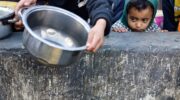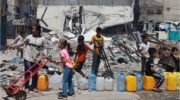Tens of thousands of migrants to Israel protest in Tel Aviv, January 2014, calling for status as refugees or asylum status. [Uriel Sinai/Getty]
Netanyahu’s right-wing government is poised to deport 38,000 refugees from Eritrea and the Sudan, claiming they are merely “infiltrators” looking for jobs. Some Israelis and Israel supporters agree; others are pushing for a more compassionate approach – one that says, “never again is not just for Jews.”
And what is the next logical step for those who recognize the plight of African refugees?
by Kathryn Shihadah
Israel is reputed to be “the only democracy in the Middle East,” a refuge for people from many nations, where history comes to life and religions coexist (in theory).
This has proven both a gift and a curse, for the abundance and potential in Israel (often fueled by US tax money) have attracted the needy from neighboring lands who hope to find comfort, solace, and safety. The tired, the poor, the huddled masses from war-torn African nations are showing up at Israel’s doorstep, undocumented and in search of asylum.
Israel’s Population and Immigration Authority estimates 38,000 Eritrean and Sudanese undocumented immigrants (or “infiltrators,” depending on who is talking). Most have been present in Israel since at least 2012.
This is about 38,000 too many for Israel’s leaders, who claim to have their citizens’ jobs and safety at heart.
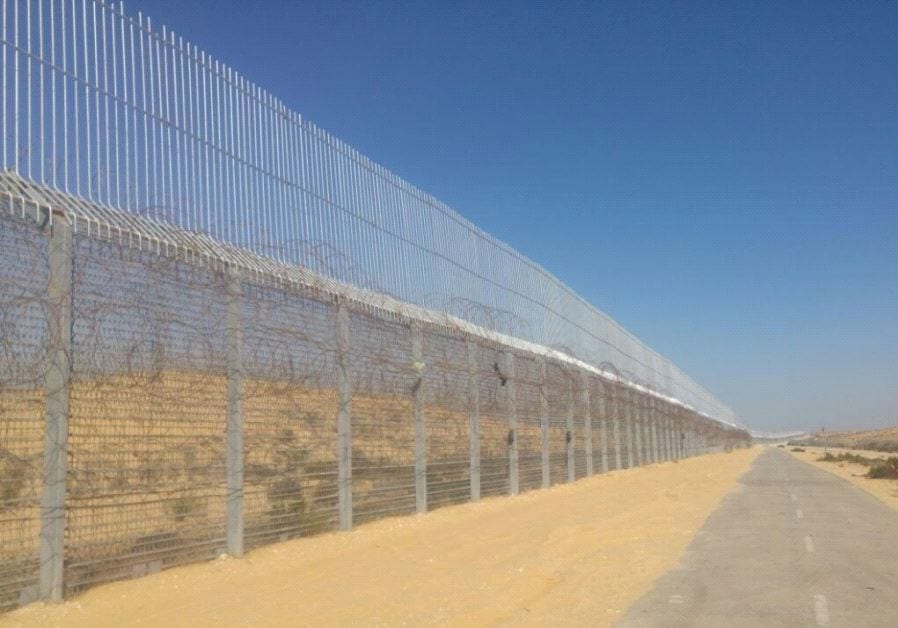
In order to first control its refugee influx, which was becoming really worrisome after 2005, Israel spent about $450 million on a 143-mile (230-km) long border wall with Egypt. The structure, completed in December 2013, has reduced the number of African immigrants entering the country to near zero.
Israel has also deported thousands of Eritreans and Sudanese already – many of them reportedly to Uganda – in exchange for military training and cheap weapons.
Why are there so many refugees?
Eritrea’s government has been perpetrating crimes against humanity for decades. The UN recently published a 448-page report revealing the criminality, which includes:
- Widespread surveillance of the population (even while abroad)
- Severe restrictions on freedom of opinion, expression, assembly, press, religion
- Arbitrary and mass arrest, detention, forced labor
- Widespread torture, extrajudicial killings, disappearance
- Dismal record of women’s rights; rape
- 12th grade in school includes military training for both boys and girls, amounting to forced conscription and soldiers younger than age 15
- Required military service is purportedly an 18-month commitment, but in reality, individuals may be kept indefinitely, sometimes for decades (avoidance of military conscription is the main reason why Eritreans flee)
The situation in the Sudan is not much better: Human Rights Watch reports:
- Attacks against civilians, including chemical weapons, cluster bombs, and aerial bombs, as well as torture, detention, and ill treatment
- Repression of basic rights of women, including rape
- Repression of civil and political rights, freedom of expression, media, and religion
- Genocide in Darfur
The people fleeing from these conditions – these are the “infiltrators.”
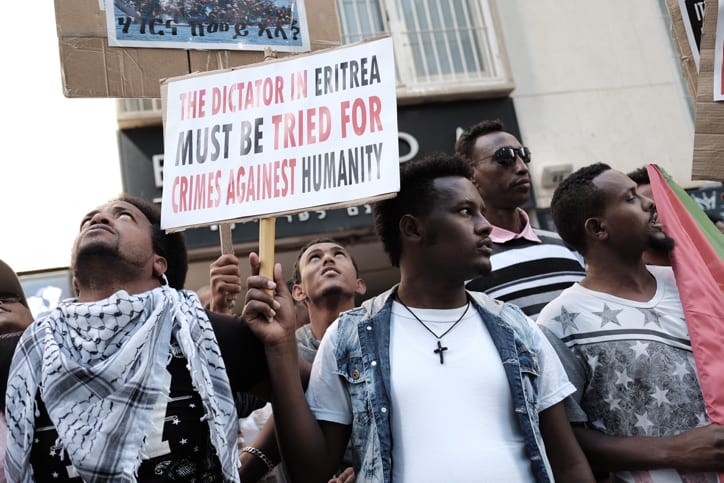
On the offensive
In 2012, as the border wall was nearing completion, Israel began a policy of detention and expulsion: African refugees were rounded up – by the thousands – and placed in a detention facility in the desert.
Detainees would stay in the facility till they agreed to accept some money and be deported. When there was space, more refugees would be collected and brought in. The refugee population thus lived with the constant fear of detention and/or deportation. Thousands left because of the pressure, either through the system, or before it reached them.
But the exodus proved frustratingly slow, so the Knesset recently passed a new law that will expedite the process: thousands more have been ordered to leave the country by the end of March 2018. In this arrangement, they will receive $3,500 plus airfare, and will be deposited either in their home country (from which they fled) or a “third country” (rumored to be Rwanda or Uganda). Those who refuse will face an indefinite prison sentence.
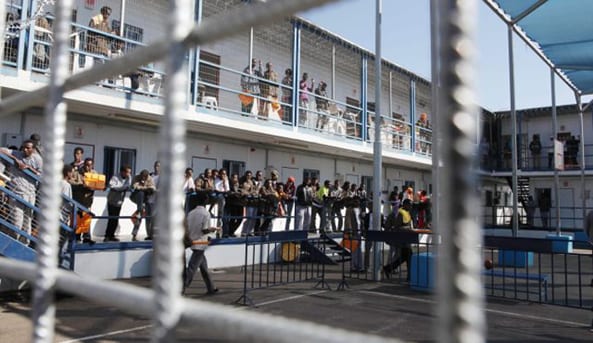
Selling expulsion
How to make a brutal deportation policy palatable to the general public?
Israel’s government knows how to manipulate the news. Prime Minister Netanyahu rationalized construction of the border wall by calling the refugee community “a threat to the social fabric of our society, our national security…our existence as a Jewish and democratic state.”
Netanyahu insists that actual asylum seekers will be safe, and only “illegal infiltrators” who have come for work will be ejected. His country’s record, however, suggests otherwise: according to the UN High Commissioner for Refugees, in the last 8 years, just 10 Eritreans and 1 Sudanese have been recognized as refugees.
Human Rights Watch points out, “[Israel has] recognized fewer than 1% of asylum applicants as refugees, compared with acceptance rates in the EU of 90% for Eritreans and 60% for Sudanese.” Israel chooses rather to ignore asylum applications or harass those who apply enough to discourage other would-be applicants from even trying.
Most African refugees who arrive in Israel are given a one-way bus ticket to South Tel Aviv. Netanyahu and others have taken to blaming them for the high rates of crime, drug use, and prostitution in that neighborhood. In fact, the area was a mess before they arrived, and the crime rate among the refugee population is extremely low.
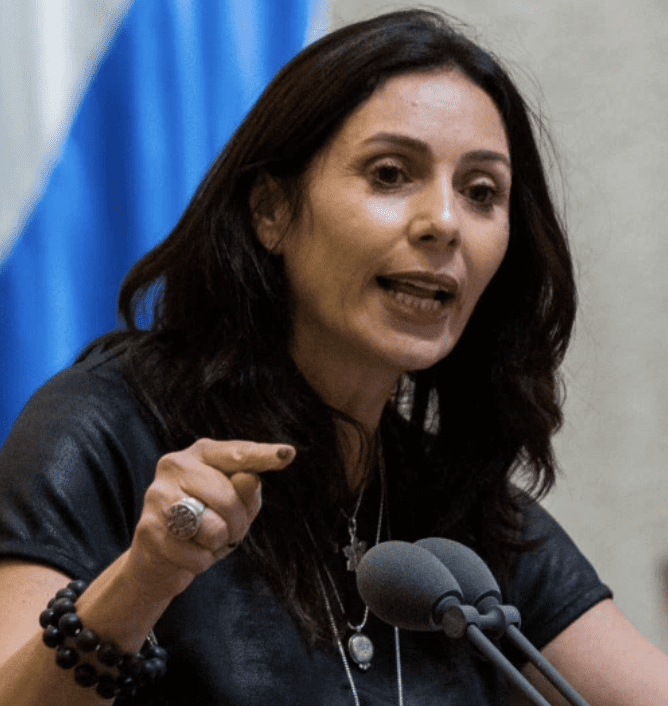
Knesset member Miri Regev described the refugees as “a cancer in our body.” (She later apologized, explaining that her words were “misconstrued,” that she was referring to the phenomenon of illegal immigration, not the immigrants themselves.)
Another Knesset member, Nurit Koren, pointed out, “There is also a security problem, because most of them are Muslims…the State of Israel [is being thrown] to the dogs.”
Former Deputy Prime Minister Eli Yishai declared that the “infiltrators” pose an existential threat to Israel: “People don’t understand what is happening to the neighborhoods in which the migrant workers live. People are scared to leave their houses…Whoever thinks I’m extreme…I’ll send him some Sudanese to his neighborhood, and then we’ll see what he says.”
On another occasion, Yishai described south Tel Aviv as the garbage can of the country, after which he declared that no country is more sensitive to foreigners’ rights than Israel.
In Israel, as in any country, there is no such thing as consensus among the population. Some Israelis agree with their government and want to run dark-skinned refugees out as fast and as far as possible, but many see parallels to the Holocaust and want to hide Africans in their attics, Anne Frank-style.
No to African refugees

Israel’s Chief Rabbi is one prominent pro-deportation figure. “The State of Israel is obliged to help refugees,” he stated, “but let’s distinguish between refugees and work [seeking] migrants.”
The heads of Israel’s Holocaust museum also favor the deportation of Israel’s African refugees. Avner Shalev and Rabbi Israel Meir Lau stated, “It is dangerous and wrong to claim that the reality of Jews during the Holocaust is identical to the current Israeli policy toward those seeking residency.”
They added that the Jewish experience teaches the need to “show compassion, empathy, and mercy as much as possible” (emphasis added), not endlessly.
One very telling example of the No is the story of Yehudah, a Kenyan Jew who recently came through the Tel Aviv airport – he had a visa, but he was black. The visa official detained Yehudah for several hours and then deported him, asking rhetorically, “Do you want half of Africa coming here?”
In 2012, a poll taken by the Israel Democracy Institute after Miri Regev’s “cancer” slur (see above) indicated that 52% of Jewish Israelis “Identif[ied] with the statement…and over a third condone[d] anti-migrant violence.”
But that was 5 years ago. Today there is a popular outcry on behalf of the refugees.
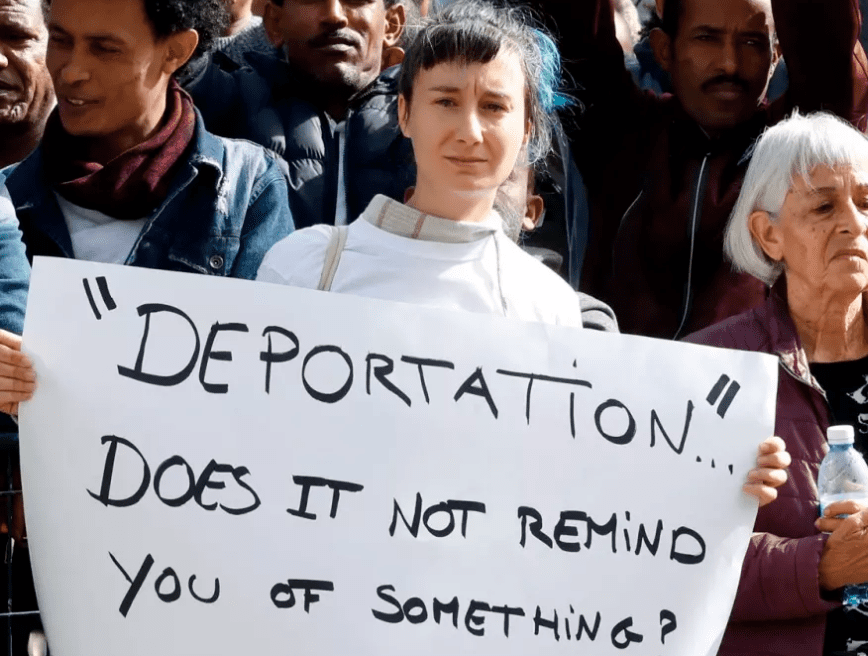
Yes to African refugees
Many clear-headed Israelis and pro-Israel Americans are speaking up against the deportation policy.
Hundreds of Israeli academics, authors, and rabbis have joined voices to urge Netanyahu and his cabinet to reconsider their position.
A number of groups, including the Center of Organizations of Holocaust Survivors in Israel – an umbrella for 55 organizations in Europe and North Africa – have also expressed support for the African refugees.
A spokesperson for that organization stated that “we, as Holocaust survivors, think it’s sad that we – precisely those who should have learned the lessons of our history – are behaving in this way toward a handful of people who are not endangering either Israel’s demography or its future.”
One Ha’aretz reader commented that the refugees will likely face deprivation or even death if returned to their home countries; to deport them is “the opposite of Tikkun Olam [repairing the world].”
In addition to Jewish Israeli groups, a large number of Jewish American, Australian,and Canadian organizations have also rallied behind the African refugees in their plight.
Rabbi Michael Lezak of human rights organization T’ruah feels that the failure to care for “the landless sojourners who seek refuge among us” threatens the Jewish character of Israel in a profound way.
Melanie Nezer of HIAS, a Jewish humanitarian organization, exhorts Israel’s leaders to recall the UN 1951 Refugee Convention, which asserts that refugees should not be sent to a country where they would face serious threats to life or liberty. Nezer remarked,
The Refugee Convention came about after the Holocaust because the international community wanted to make sure that something like it never happened again…As the first signatory to the convention, Israel has a responsibility to uphold its standards…Israel needs to do right by these African asylum seekers.
Many in Israel and abroad believe that Israel should follow the ancient words of the holy book the state of Israel officially represents:
Leviticus 19:33-34 “When a foreigner resides among you in your land, do not mistreat them. The foreigner residing among you must be treated as your native-born. Love them as yourself, for you were foreigners…I am the Lord your God.”
They believe that the words “never again” are not meant to be Jewish-only words. They are universal. Anyone experiencing hate and prejudice should be embraced by “never again.”
The academics, authors, and rabbis who came together against Netanyahu and his anti-refugee policy, the Ha’aretz reader who pointed out that sending refugees away is “the opposite of Tikkun Olam [repairing the world]” are proponents of policies of compassion that they believe represent what Israel was meant to be.
The rabbi who wants Israel to preserve its Jewish character by caring for “the landless sojourners who seek refuge,” the woman who exhorted Israel to uphold the standards and spirit of the 1951 Refugee Convention, are part of a movement in Israel that may eventually reconsider some of Israel’s basic policies.
 Supporting all refugees
Supporting all refugees
It is entirely conceivable that one whose heart goes out to the African asylum seeker may begin to find him or herself seeing that other refugee – the Palestinian – in a whole new light.
How many have the courage to look straight in the eye of that which challenges their paradigm and admit that it is their paradigm, not the evidence before them, that is flawed?
There are many individuals inside and outside Israel, people of great integrity, who have done the hard work of rediscovering Palestinians as a people. They are eager to share their new paradigm – and the fact that their advocacy for a troubled people is a profoundly meaningful form of Tikkun Olam.
Kathryn Shihadah is a staff writer for If Americans Knew
Our operations are funded solely by generous individuals like you. Your contribution will help us continue shining a light on the Israel/Palestine situation and the U.S. connection.
DONATE
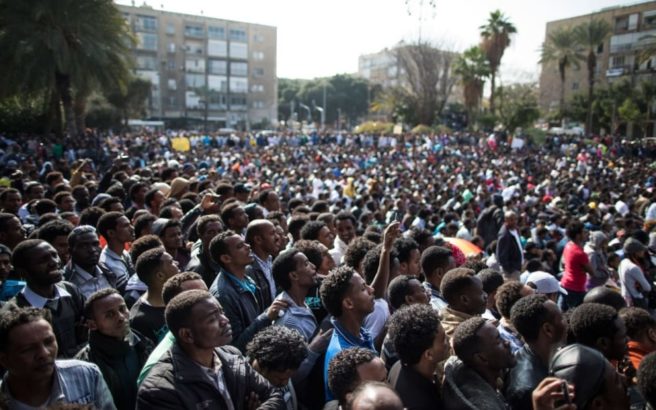
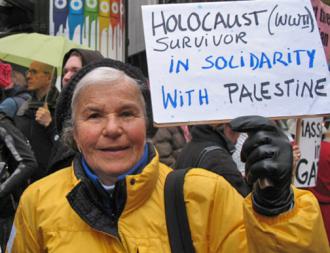 Supporting all refugees
Supporting all refugees

